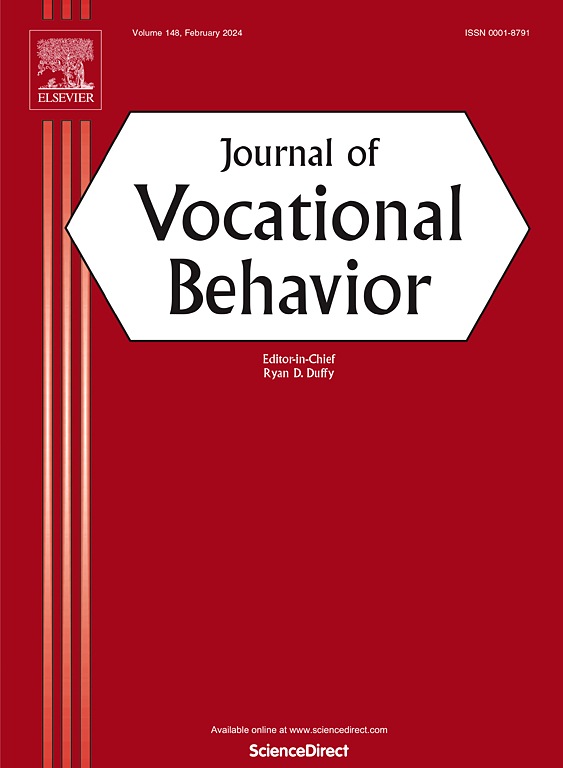全力以赴还是几乎不付出?导师对被指导者晋升潜力的看法和性别在指导关系中的作用
IF 5.2
1区 心理学
Q1 PSYCHOLOGY, APPLIED
引用次数: 0
摘要
我们的研究对正规指导项目中的公平假设提出了挑战。根据指导模式和多元化指导理论,我们推测指导者对被指导者晋升潜力的看法会预测他们提供的职业支持和他们之间关系的质量,而且这些影响会因性别而异。通过配对设计,我们在两项针对指导者及其被指导者的实地研究中检验了我们的模型(总人数 = 355 对)。结果与理论预测相吻合,当指导者认为被指导者的晋升潜力较低时,他们对被指导者的职业兴趣较低,提供的职业指导较少,受到的尊重较少,对双方关系的满意度也较低。当导师认为受训者缺乏潜力时,受训者在双方关系中受到的尊重也较少。性别起到了微妙的作用。虽然导师认为女性和男性受训者具有同等的晋升潜力,但当被指派给男性而不是女性导师时,女性受训者被认为潜力较小,所受到的尊重也较少。与女性导师相比,当男性导师认为其指派的受训者具有较高潜力时,他们在双方关系中更受尊重。我们的研究结果挑战了有关指导项目中提供职业支持和尊重的假设,提供了有关性别细微影响的见解,并呼吁采取干预措施,帮助组织实现指导的承诺。本文章由计算机程序翻译,如有差异,请以英文原文为准。
Give it your all or hardly give? The role of mentors' beliefs about protégé advancement potential and gender in mentoring relationships
Our research challenges assumptions about equity in formal mentoring programs. Drawing on mentoring schema and diversified mentoring theory, we theorized that mentors' beliefs about their protégés' advancement potential predict the career support they provide and the quality of their relationship, and that these effects vary by gender. Using matched-pair designs, we tested our model in two field studies of mentors and their protégés (total n = 355 dyads). Supporting theoretical predictions, mentors showed less interest in their protégés' careers, provided less career guidance, experienced less respect, and were less satisfied with their relationship when they believed their protégé had low advancement potential. Protégés also experienced less respect in their relationship when their mentor perceived them as lacking potential. Gender played a nuanced role. While mentors saw female and male protégés as having equivalent advancement potential, female protégés were seen as having less potential and experienced less respect when assigned a male rather than a female mentor. Compared to their female counterparts, male mentors felt more respected in their relationship when they believed their assigned protégé had high potential. Our findings challenge assumptions about the career support and respect provided in mentoring programs, offer insights about the nuanced effects of gender, and call for interventions that help organizations fulfill the promise of mentoring.
求助全文
通过发布文献求助,成功后即可免费获取论文全文。
去求助
来源期刊

Journal of Vocational Behavior
PSYCHOLOGY, APPLIED-
CiteScore
13.10
自引率
5.40%
发文量
85
期刊介绍:
The Journal of Vocational Behavior publishes original empirical and theoretical articles offering unique insights into the realms of career choice, career development, and work adjustment across the lifespan. These contributions are not only valuable for academic exploration but also find applications in counseling and career development programs across diverse sectors such as colleges, universities, business, industry, government, and the military.
The primary focus of the journal centers on individual decision-making regarding work and careers, prioritizing investigations into personal career choices rather than organizational or employer-level variables. Example topics encompass a broad range, from initial career choices (e.g., choice of major, initial work or organization selection, organizational attraction) to the development of a career, work transitions, work-family management, and attitudes within the workplace (such as work commitment, multiple role management, and turnover).
 求助内容:
求助内容: 应助结果提醒方式:
应助结果提醒方式:


